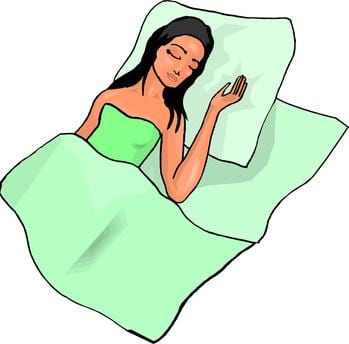A serious disorder that affects both men and women, sleep apnea can disrupt your sleep and cause other complications. If your breathing stops and starts repeatedly throughout the night, you may suffer from this condition. The Mayo Clinic warns that you may have sleep apnea if you feel tired even after you get a full night of sleep. Loud snoring may also signal the presence of this disorder. Consult your doctor if you think you may have sleep apnea. Certain lifestyle changes, as well as therapeutic treatments, may help to reduce your symptoms and allow you to enjoy a restful night’s sleep.
Stop Smoking
In addition to causing other health risks, smoking may irritate your throat, lungs and nasal passages, making your sleep apnea worse. Try to quit smoking or cut back on the number of cigarettes you smoke each day. If you have trouble quitting on your own, talk to your doctor about medications that may help you break your smoking habit.
Change Your Position
Sleeping on your back can increase snoring and worsen your condition. This position causes your tongue to rest against the back of your airway, blocking your breath. Keep your airway open by sleeping on your stomach or on your side. Use pillows to support your body in position or sew a tennis ball into the back section of your pajama shirt to discourage you from rolling onto your back when you sleep.
Reduce Excess Weight
The Mayo Clinic advises overweight individuals to shed excess pounds. In some cases, dieting can cure sleep apnea. Consider joining a weight loss program or talk to a nutritionist about healthy diet plans. Losing your excess weight may help to reduce throat constriction that leads to sleep apnea.
Skip Your Nighttime Cocktail
Alcoholic drinks can cause your muscles to relax, including the muscles in your throat. These relaxed muscles can block your airway and interfere with your breathing, increasing your risk of sleep apnea. Certain medications, such as sleeping pills and tranquilizers, may also encourage these muscles to relax, causing your throat to constrict while you sleep.
Medical Therapies
If self-help measures don’t help, you may require medical treatment. Your doctor may recommend you use supplemental oxygen while you sleep. He may also suggest you wear a type of pressurized mask that gently forces air into your lungs or sleep with an oral appliance that maximizes your airway opening. You may require surgery if tests show that a physical obstruction, such as nasal polyps, contributes to your sleep apnea.
Photo Credit
- Sleeping image by Clark Duffy from Fotolia.com





